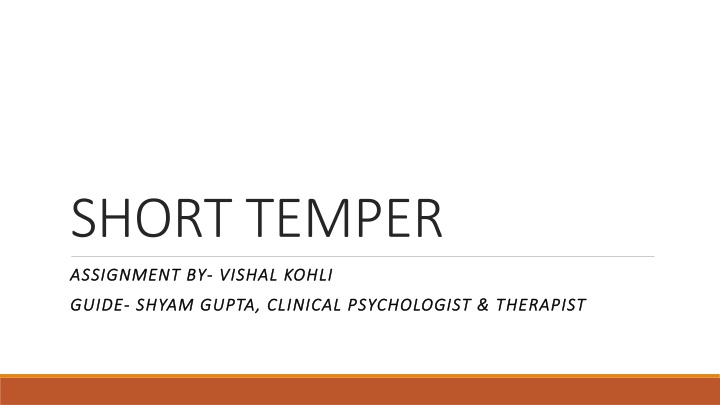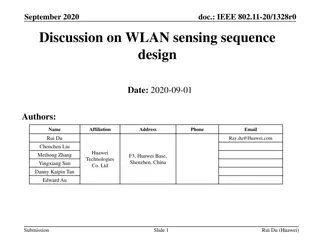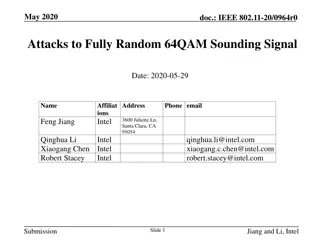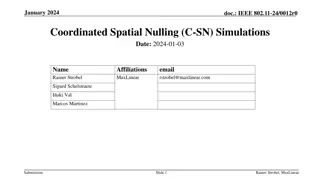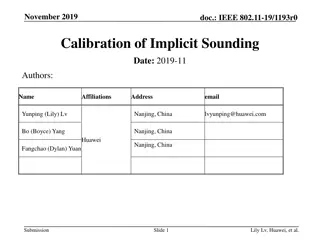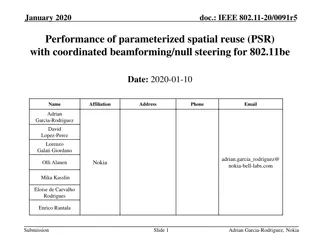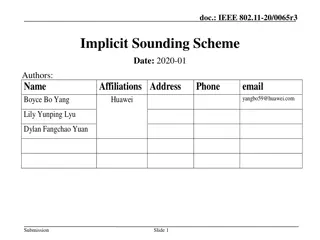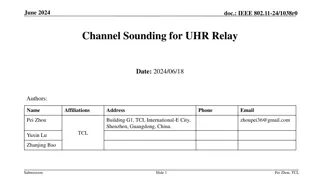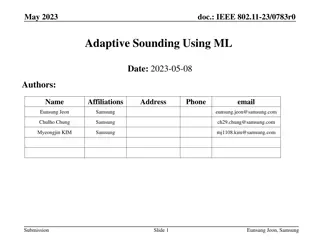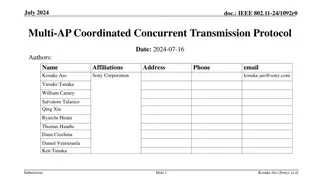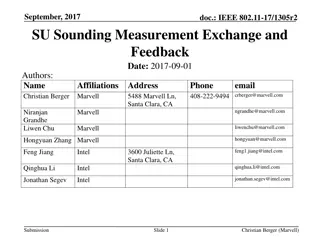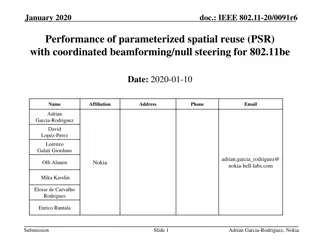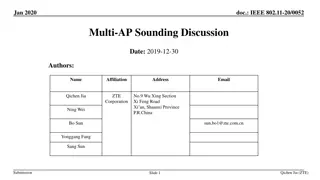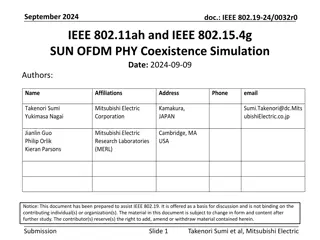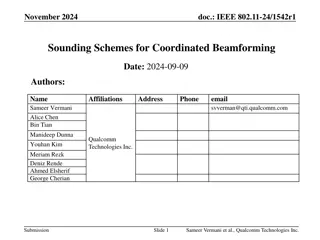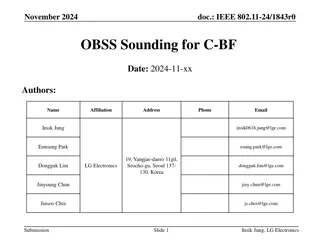Coordinated Sounding Sequences in IEEE 802.11-24
This document delves into the concept of coordinated sounding sequences within IEEE 802.11-24, specifically focusing on Sequential Sounding, Joint Sounding, and the comparison in airtime implications. It discusses the nuances of NDP Global Index LTFs, viewing from the perspective of various AP configurations and the impact on CSI information solicitation. Through detailed slides, the presentation offers insights into enhancing CoBF in TGbn with efficient sounding strategies.
Download Presentation

Please find below an Image/Link to download the presentation.
The content on the website is provided AS IS for your information and personal use only. It may not be sold, licensed, or shared on other websites without obtaining consent from the author.If you encounter any issues during the download, it is possible that the publisher has removed the file from their server.
You are allowed to download the files provided on this website for personal or commercial use, subject to the condition that they are used lawfully. All files are the property of their respective owners.
The content on the website is provided AS IS for your information and personal use only. It may not be sold, licensed, or shared on other websites without obtaining consent from the author.
E N D
Presentation Transcript
SHORT TEMPER ASSIGNMENT ASSIGNMENT BY BY- - VISHAL KOHLI VISHAL KOHLI GUIDE GUIDE- - SHYAM SHYAM GUPTA, CLINICAL PSYCHOLOGIST & THERAPIST GUPTA, CLINICAL PSYCHOLOGIST & THERAPIST
WHAT IS SHORT-TEMPER? Short Temper Is Defined as a tendency Of a Person to become angry very quickly and easily. In Other words, Quick to lose one's temper.
WHAT SHORT TEMPER LOOK LIKE The person tend to have symptoms that are both physical and psychological, such as: rage in the form of yelling and shouting chronic irritability heart palpitations racing thoughts loss of control
What Causes Short Temper? A leading cause of anger is a person s environment. Stress, financial issues, abuse, poor social or familial situations, and overwhelming requirements on your time and energy can all contribute to the formation of anger. As with disorders such as alcoholism, anger issues may be more prevalent in individuals who were raised by parents with the same disorder. Genetics and your body s ability to deal with certain chemicals and hormones also play a role in how you deal with anger; if your brain doesn t react normally to serotonin, you might find it more difficult to manage your emotions
Causes Of Short Temper 1 Stress 2 Anger 3 Financial Problems 4 Family Problems 5 Low Blood Sugar Level 6 Hormonal Change 7 Abuse 8 Poor Social Situations
Symptoms Of Short Temper Anger causes physical and emotional symptoms. While it s normal to experience these symptoms on occasion, a person with anger issues tends to experience them more often and to a more severe degree
The physical signs and symptoms of Short temper include: Increased blood pressure Increased heart rate Tingling sensation Muscle tension
The Emotional signs and symptoms of Short temper include: Irritability Frustration Anxiety Rage Stress Feeling overwhelmed Guilt
How To Handle Short Temper : 1 Practice mindfulness 2 Refocus your energy 3 Get physical 4 Use a daily mood chart
How To Practice Mindfulness : Incorporating mindfulness into your regular routine can help you better understand and control the reactivity that often drives a short temper. The next time you feel your temper rising, try this exercise: 1.Find a quiet room and a comfortable place to sit. 2.Close your eyes and notice the physical sensation of anger travel through your body, whether it s through your rapid heart rate or your clenched jaw. 3.Inhale deeply and allow all thoughts of anger to release as you exhale. 4.Repeat 2 to 3 times per day or whenever you start to feel anger arise
How To Refocus On Your Energy : Come up with some concrete strategies for dealing with situations that you know will trigger your temper. If you know your daily commute tends to set you off, for example, set aside some time to focus on alternative options. Waking up earlier to catch an emptier train or carpooling with a coworker might make all the difference. Even if it doesn t resolve the situation immediately, turning your attention to problem- solving can give you a greater sense of control and keep you from blowing up.
How To Get Physical : When you start to feel your blood boil, work it off with an exercise session. Go out for a quick run, play a sport that gets your heart pumping, or swim a few laps in the neighborhood pool. Regular physical activity is an effective way of increasing self-control and immediately calming your mind and body.
How To Use Daily Mood Chart : Track episodes of anger and irritability by keeping a daily record of your moods. You can do this in a notebook or even download one of the countless mood-tracking apps available for your phone. To get an extra clear picture of your moods, try to also take note of your intake of caffeine or other substances, quality of sleep, stressful situations or conversations, and any underlying emotions like fear or disappointment.
Effective Ways to Control Short Temper : 1 Take a timeout 2 Don t carry your temper 3 Practice relaxation techniques 4 Take a walk 5 Take a class you enjoy 6 Change your mindset 7 Think of a funny memory 8 Discuss how you feel 9 Listen to music during stressful times 10 Identify a solution 11 Know your triggers 12 Smile 13 Look at your environment 14 Find a place you can be alone 15 Use calming scents
Conclusion: In conclusion, managing anger and stress can seem very hard and overwhelming at times. Stress and anger are sometimes very hard to overcome and defeat, but there are ways and methods that I find are the most effective. "So keep calm and don't stress."
